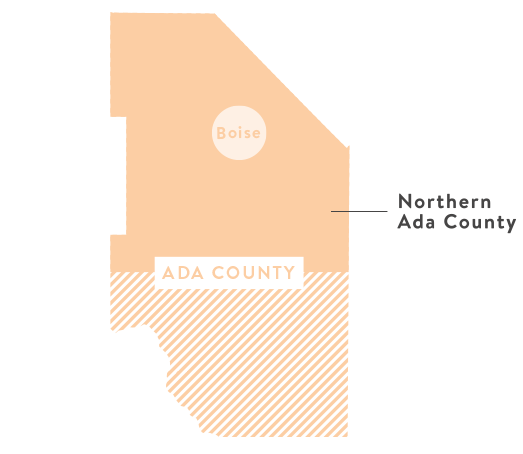
Air Quality
It is no secret that vehicles emit air pollution. What is less commonly understood, however, is that changes to the transportation system, such as widening roads or adding roads, or significantly changing public transportation, can impact how much pollution is emitted.
Whenever COMPASS updates Communities in Motion we are required to demonstrate that the transportation projects funded through the plan will not harm air quality. This is referred to as an “air quality conformity demonstration.”
WHAT’S IT ALL ABOUT?
The federal government sets health-based standards for air pollution. Areas that have violated these standards are called “nonattainment areas.” Areas that were nonattainment areas in the past, but have re-attained the standard, are called “maintenance areas.”
 Northern Ada County is a maintenance area for two pollutants – coarse particulate matter (airborne dust and other particles; referred to as “PM10”) and carbon monoxide. Northern Ada County violated the standard for these pollutants in the 1980s and early 1990s, but has been in compliance ever since. Transportation projects that use federal funds or are “regionally significant” in nonattainment or maintenance areas, such as Northern Ada County, must conduct an air quality conformity demonstration to show that the projects do not make air quality worse.
Northern Ada County is a maintenance area for two pollutants – coarse particulate matter (airborne dust and other particles; referred to as “PM10”) and carbon monoxide. Northern Ada County violated the standard for these pollutants in the 1980s and early 1990s, but has been in compliance ever since. Transportation projects that use federal funds or are “regionally significant” in nonattainment or maintenance areas, such as Northern Ada County, must conduct an air quality conformity demonstration to show that the projects do not make air quality worse.
The Idaho Department of Environmental Quality has developed plans that show how Northern Ada County will maintain compliance with the standards for PM10 and carbon monoxide.
For PM10, the plan includes pollution “budgets” for PM10 itself, as well as for pollutants that can combine to create PM10. COMPASS must show that transportation projects would not cause motor vehicle emissions to exceed those budgets. For carbon monoxide, the process is different – COMPASS compares the emissions that would be emitted if the projects were built against emissions that would be emitted if they were not.
Communities in Motion only plans for ground transportation; it does not include air transportation. Therefore, emissions related to air travel are not part of this demonstration.
WHY DOES IT MATTER?
First and foremost, we want to protect the health of Treasure Valley residents. Polluted air is unhealthy to breathe – especially for the young, old, and people with pre-existing respiratory conditions, such as asthma. COMPASS wants to ensure the projects in our plans are part of the solution…not part of the problem.
Second, if we cannot demonstrate that the projects in Communities in Motion 2040 2.0 meet air quality conformity requirements, federally funded and/or regionally significant transportation projects cannot be built.
SO, WHAT’S THE BOTTOM LINE?
COMPASS has estimated the air quality impacts associated with the projects in Communities in Motion 2040 2.0. The estimated impacts demonstrate that the projects contained in Communities in Motion 2040 2.0 meet air quality conformity requirements for Northern Ada County and will not degrade air quality.
In other words, Communities in Motion 2040 2.0 passed the test.


